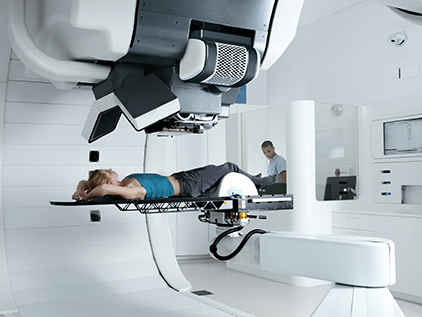- Home
- Types & Treatments
- Bone Cancer (Sarcoma)
- Treatments
Bone Cancer (Sarcoma)
Bone Cancer Treatment
Sarcomas demand specialized expertise in diagnosis, bone cancer treatment and rehabilitation for the best outcome. The University of Kansas Cancer Center brings together the region’s premier multidisciplinary sarcoma team to treat uncommon bone and soft-tissue tumors in children, teens and adults.
Bone Cancer Treatment Options
From diagnosis through recovery, you’ll receive the full spectrum of care for the whole person. In addition to the latest surgical, medical and radiation options, we provide educational, emotional and spiritual support for people living with sarcoma. Our surgical techniques and therapies include:
- Carbon fiber technology for bone reconstruction
- Complex vascular resection and reconstruction
- Customized modular limb reconstruction techniques
- 3D pelvic reconstruction
- Rotationplasty
- Reverse shoulder replacement
- Growing prostheses for the youngest patients
- Intensity-modulated radiation therapy
- Minimally invasive radiofrequency ablation
- Stereotactic radiosurgery
- 3D printed surgical planning guides (for more precise tumor removal)
After a sarcoma is found and staged, the cancer care team will recommend one or several bone cancer treatments, depending on its location and how far the cancer has spread. Options may include:


Bone Cancer Clinical Trials
As a National Cancer Institute-designated cancer center, we are actively involved in sarcoma research. This includes investigating the application of bioengineering and biomechanical techniques to the development of prosthetic limbs for sarcoma patients. Additionally, we offer a range of clinical research trials designed to identify safer and more effective approaches to the prevention, screening, diagnosis and treatment of cancer.
NCI-designated cancer centers like The University of Kansas Cancer Center have achieved the highest standards in cancer care and research. Promising cancer research leads to improved treatment.

Immunotherapy clinical trials
To learn about our current immunotherapy clinical trials, call 913-945-7552 or search our open clinical trials.
Find a clinical trial
Life after bone cancer
At The University of Kansas Cancer Center, we offer advanced reconstruction techniques as part of your bone cancer survivorship services:
- 3D custom pelvis reconstruction
- Surgically implanted prosthetic devices for children that can grow with the child in a noninvasive way
- Reverse shoulder resection for humerus tumors
- Rotationplasty, which uses the ankle to create a new knee joint
- 3D-printed cutting guides for precise resection of bone tumors that remove the minimum amount of healthy bone
- Custom prosthetic designs
We also connect patients with Turning Point, a program of The University of Kansas Health System. Turning Point offers cancer-related wellness programs and educational classes at no charge, including empowerment programs for children of all ages.
Start your path today.
Your journey to health starts here. Call 913-588-1227 or request an appointment at The University of Kansas Cancer Center.